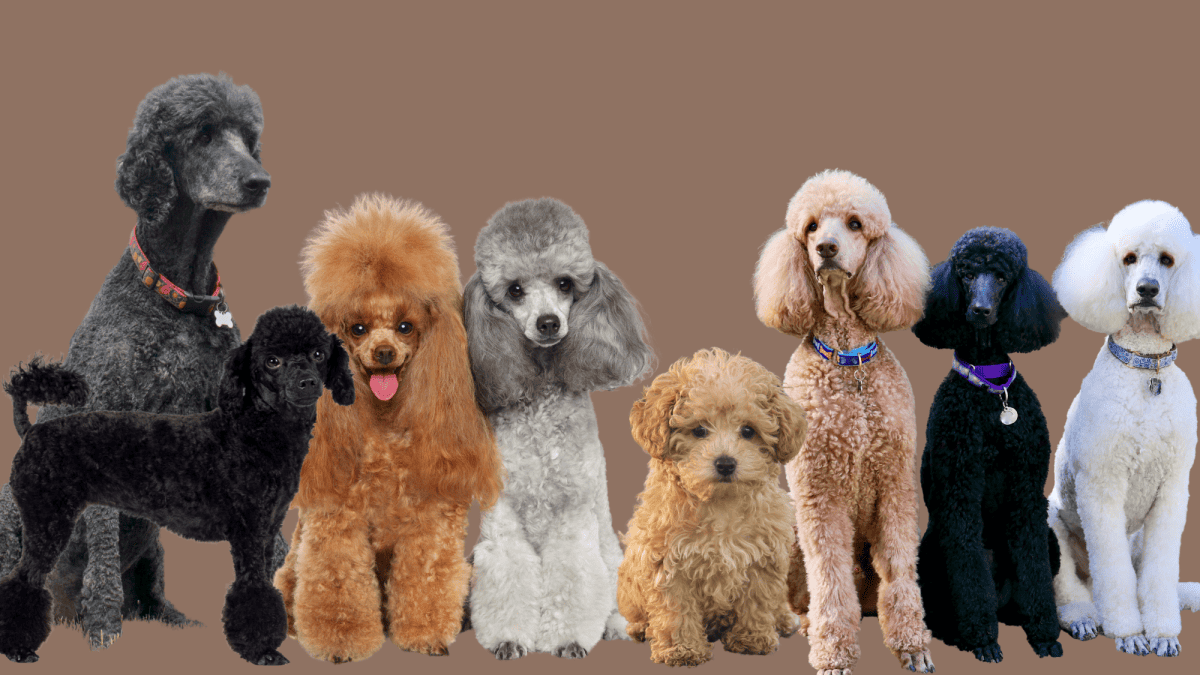Poodles have long been one of the most popular dog breeds around the world. With their distinctive curly coats and elegant appearance, it’s no wonder that they are often seen as a desirable pet. The history of poodles as a popular breed can be traced back to their origins in Germany, where they were originally bred for hunting waterfowl. Over time, however, poodles gained popularity as companion dogs due to their intelligence, loyalty, and versatility. Some may ask “Why Poodles are the worst breed”“.
As an avid dog lover who has had the pleasure of owning several poodles throughout my life, I can attest to their charm and appeal. In today’s post, I also want to shed light to that question for many new dog owners here on PetSWAT.
There is something truly special about the bond between a poodle and its owner. They are incredibly affectionate animals who thrive on human companionship and make excellent family pets.
Key Takeaways
- Poodles are prone to health issues, including hip dysplasia and eye problems.
- Grooming a poodle can be time-consuming and expensive.
- Poodles can be stubborn and difficult to train, and are prone to separation anxiety.
- Poodles require more exercise than many people realize.
- Poodles may not be hypoallergenic and need plenty of socialization with humans and other dogs.
Health Issues in Poodles: Common Problems to Look Out For
While poodles are generally healthy dogs with an average lifespan of 12-15 years, there are some health issues that potential owners should be aware of. One common problem in poodles is hip dysplasia, which is a genetic condition that affects the hip joints and can cause pain and mobility issues.
Another health issue that plagues many poodles is progressive retinal atrophy (PRA), which leads to gradual vision loss over time. This condition can be devastating for both the dog and its owner but can be managed with proper care.
Additionally, like many purebred dogs, poodles are prone to certain genetic predispositions such as epilepsy or Addison’s disease. It’s important for potential owners to research these conditions thoroughly before bringing home a new furry friend.
Grooming: The Time and Money Involved in Keeping Poodles Looking Their Best
One aspect of owning a poodle that cannot be overlooked is grooming requirements. Poodle coats require regular maintenance to keep them looking their best – this includes brushing several times a week to prevent matting and regular trips to the groomer for haircuts.
As a poodle owner, I have spent countless hours brushing and grooming my dogs. While it can be time-consuming, it is also an opportunity for bonding and pampering your furry friend. However, it’s important to note that grooming can be quite expensive, especially if you opt for professional grooming services. The cost of regular haircuts and maintenance can add up quickly.
Behavioral Issues: Poodles Can Be Stubborn and Difficult to Train
| Behavioral Issues | Poodles |
|---|---|
| Stubbornness | High |
| Trainability | Difficult |
| Exercise Needs | High |
| Socialization | Important |
| Barking Tendency | High |
One common misconception about poodles is that they are easy to train due to their high intelligence. While poodles are indeed intelligent dogs, they can also be stubborn and independent-minded, which can make training a challenge.
I remember when I first brought home my poodle puppy, Max. He was full of energy but had a mind of his own when it came to following commands. It took patience, consistency, and positive reinforcement training methods to help him understand what was expected of him.
Poodles thrive on mental stimulation and need plenty of exercise both physically and mentally. Engaging them in activities such as obedience training or puzzle toys can help keep their minds sharp while providing an outlet for their energy.
Separation Anxiety: Why Poodles Are Prone to This Condition
Separation anxiety is a common issue among many dog breeds, but poodles seem particularly prone to this condition due to their strong attachment bonds with their owners. When left alone for extended periods of time, poodles may exhibit destructive behaviors or excessive barking as a result of anxiety.
To prevent separation anxiety in poodles, it’s important to gradually acclimate them to being alone from an early age by practicing short periods of separation while providing them with engaging toys or treats that keep them occupied during your absence.
Additionally, ensuring that your poodle gets plenty of exercise before leaving them alone can help tire them out and reduce anxiety. Consider hiring a dog walker or enrolling them in doggy daycare if you have a busy schedule that keeps you away from home for long periods.
Exercise Needs: Poodles Require More Activity Than You Might Think
Contrary to popular belief, poodles are not just fancy lapdogs. They are an active breed that requires regular exercise to keep them happy and healthy. Poodles were originally bred as hunting dogs, which means they have a natural instinct for physical activity.
As an owner of standard poodles, I can attest to their need for exercise. Daily walks or runs, along with playtime in the backyard or at the park, are essential to meet their exercise requirements. Without adequate physical activity, poodles may become bored and exhibit destructive behaviors.
It’s important to note that the amount of exercise needed will vary depending on the size and age of your poodle. Standard poodles generally require more exercise than miniature or toy varieties due to their larger size and higher energy levels.
Cost: The Financial Burden of Owning a Poodle
Owning any pet comes with financial responsibilities, and owning a poodle is no exception. From initial adoption fees or purchase costs to routine veterinary care, grooming expenses, food bills, toys, training classes – it all adds up.
As someone who has owned multiple poodles over the years, I can say that they can be quite expensive pets compared to some other breeds due to their grooming needs and potential health issues associated with purebred dogs.
It’s important for potential owners to budget accordingly before bringing home a new furry family member. Researching local veterinarians’ prices for routine care such as vaccinations and spaying/neutering is crucial in understanding ongoing costs associated with owning a poodle.
Allergies: Poodles May Not Be Hypoallergenic After All
Poodles have long been touted as a hypoallergenic breed, making them an attractive choice for individuals with allergies. However, recent research suggests that poodles may not be as hypoallergenic as previously thought.
While it is true that poodles have hair instead of fur, which reduces the amount of dander they shed, it does not mean they are completely allergen-free. People with severe allergies should spend time with a poodle before committing to ownership to see if they experience any allergic reactions.
It’s important to note that individual reactions can vary greatly from person to person. Some people may find that they have no issues with poodles despite having allergies, while others may still experience symptoms even with minimal exposure.
Socialization: Poodles Need Plenty of Interaction with Humans and Other Dogs

Poodles are highly social animals and require plenty of interaction with humans and other dogs to thrive. Early socialization is crucial in shaping their behavior and ensuring they grow up to be well-rounded adults.
As a responsible owner, I made sure my poodle puppies were exposed to various environments, people of different ages and backgrounds, as well as other dogs from an early age. This helped them develop confidence and good manners when interacting with others.
Regular trips to the dog park or playdates with other friendly dogs can provide valuable opportunities for your poodle to learn appropriate social skills while burning off excess energy in a safe environment.
Size: Poodles Come in Three Different Varieties, Each With Its Own Challenges
Poodles come in three different size varieties – standard, miniature, and toy – each offering its own unique set of challenges for owners.
Standard poodles are the largest variety and require more space both indoors and outdoors due to their size. They also tend to have higher energy levels compared to their smaller counterparts.
Miniature poodles are smaller but still energetic dogs who need regular exercise just like standard-sized ones. They make great companions for individuals or families living in apartments or smaller homes.
Toy poodles are the smallest variety and are often seen as lapdogs. They require less exercise but still need mental stimulation to prevent boredom.
It’s important for potential owners to consider their lifestyle, living arrangements, and ability to meet the specific needs of each size variety before making a decision.
Is a Poodle Right for You? Why Poodles are the worst breed?
In conclusion, owning a poodle can be a rewarding experience for the right person or family. They are intelligent, loyal, and affectionate companions who thrive on human interaction and mental stimulation.
However, it’s important to consider all aspects of owning a poodle before making a decision. From grooming requirements and potential health issues to training challenges and financial responsibilities – there is much to consider.
If you have the time, patience, resources, and love to give, then a poodle may be the perfect addition to your household. However, if you’re looking for an easy-to-maintain pet with minimal grooming needs or if you have severe allergies that may not be compatible with poodles despite their hypoallergenic reputation – it may be best to explore other breeds that better suit your lifestyle.
Ultimately, only you can decide if a poodle is right for you. Take into account your personal preferences and circumstances before bringing home one of these wonderful dogs who will undoubtedly bring joy into your life.
FAQs
What are some common health problems that poodles face?
Poodles are prone to a variety of health issues, including hip dysplasia, eye problems, skin allergies, and ear infections.
Do poodles require a lot of grooming?
Yes, poodles have a thick, curly coat that requires regular grooming to prevent matting and tangling. They also need to be trimmed every six to eight weeks.
Are poodles good with children?
Poodles can be good with children, but they require socialization and training from a young age. They can be sensitive and easily overwhelmed, so they may not be the best choice for families with very young children.
Do poodles shed?
Poodles are considered a hypoallergenic breed because they do not shed much. However, their curly coat requires regular grooming to prevent matting and tangling.
Are poodles easy to train?
Poodles are generally intelligent and eager to please, which can make them easy to train. However, they can also be stubborn and independent, so consistent training and socialization are important.
Do poodles have a lot of energy?
Poodles are an active breed and require regular exercise to stay healthy and happy. They enjoy activities like walking, running, and playing fetch, but they can also be content with a daily walk or play session.
Are poodles prone to separation anxiety?
Poodles can be prone to separation anxiety if they are not properly socialized and trained. They are a social breed and thrive on human interaction, so they may become anxious or destructive if left alone for long periods of time.
Originally posted 2024-01-26 02:56:45.
Johny is a dedicated pet enthusiast, author, and the driving force behind the insightful content at PetSWAT. With a deep passion for animals and a wealth of knowledge acquired through years of experience, Johny brings a unique perspective to the world of pet care and companionship.




